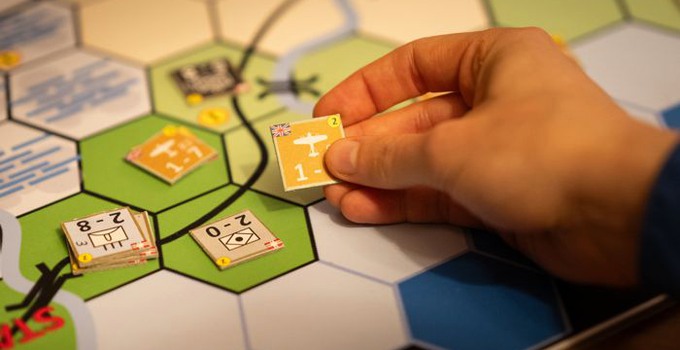
Krigsspel är utformade för att öka förståelsen för krigets komplexitet och förbättra krigföringsförmågan. Foto: Anders G Warne.
New doctoral thesis analyzes how wargaming functions
In his thesis, Patrik Hulterström explores how wargaming can enhance learning and military training. Among other contributions, he has developed a framework that can be used to analyze wargames and to increase understanding of how they can be utilized.
Patrik Hulterström is a captain and military teacher at the Department of War Studies at the Swedish Defence University. On 7 September, he defended his thesis in philosophy - From Play to Power: A Philosophical Inquiry into How Educational Wargaming Can Help Cultivate Battlefield Acumen - at Åbo Akademi University.
"My thesis has an epistemological, that is, a theory of knowledge, orientation. The result of my research is a conceptual framework for thinking about wargames and how they can promote learning about warfare,” he says.
Why have you chosen to research this particular topic?
“I have long worked with wargaming in education at the Swedish Defence University and attended several wargaming conferences. Early on, I was struck by the field being characterized by both overconfidence and strong skepticism. Some exhibit an almost religious belief in the excellence of wargames, while others cannot see how they can teach anything at all. What I missed was a critical examination of the basic epistemological questions concerning wargames and their significance for the ability to conduct war.”
Understanding how wargames function as learning tools
Wargames are designed to increase understanding of the complexity of war and improve warfare capabilities. However, despite wargames having been used for these purposes for a long time, the understanding of if and how they function as learning tools remains limited, according to Patrik Hulterström.
“Hopefully, the conceptual framework I developed can inspire further research and debate in the field, facilitate the development of more effective wargames, and promote military education,” he says.
Insights from various fields
In his thesis, he has used the philosophical method of "reflective equilibrium." This method involves attempting to balance beliefs, theories, experiences, and values in a dynamic process, where one continually adjusts beliefs and assumptions to form a coherent and mutually supportive conceptual whole.
“In my research, this methodology starts with existing ideas on how wargames promote learning and then systematically refines, modifies, and adjusts these beliefs. The process integrates insights from military theory, psychology, philosophy, and other relevant fields,” he explains.
Publication
Patrik Hulterström (2024): From Play to Power: A Philosophical Inquiry into How Educational Wargaming Can Help Cultivate Battlefield Acumen.
Page information
- Published:
- 2024-09-09
- Last updated:
- 2024-09-09
